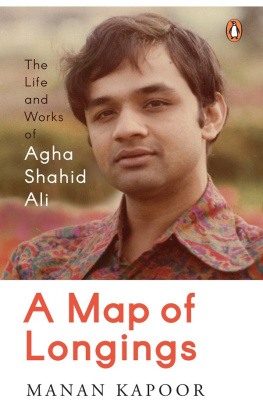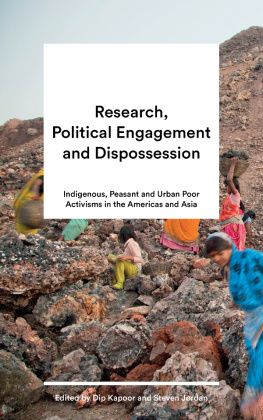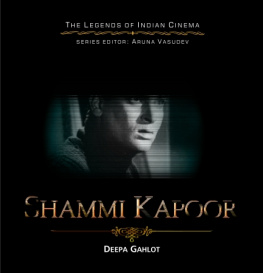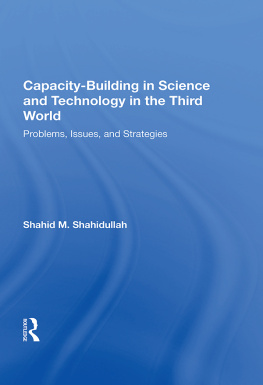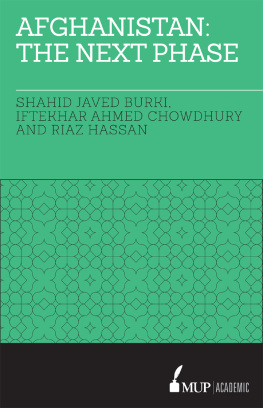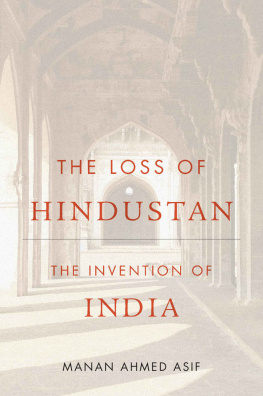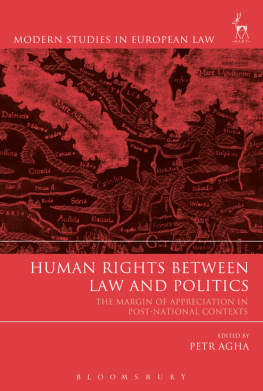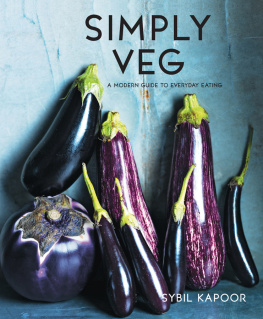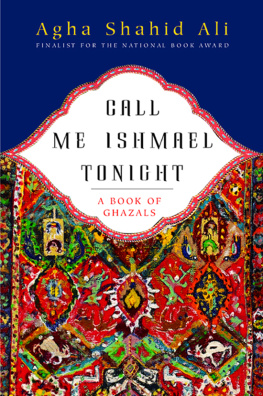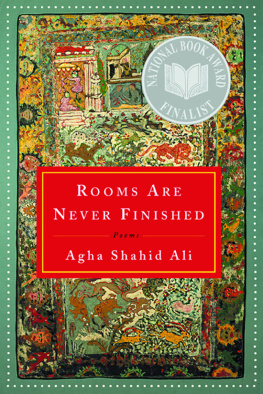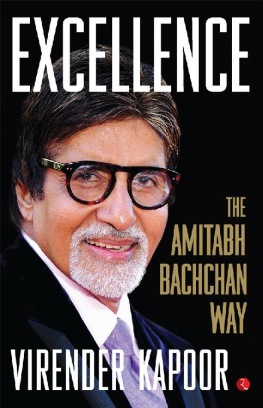Manan Kapoor - A Map of Longings: The Life and Works of Agha Shahid Ali
Here you can read online Manan Kapoor - A Map of Longings: The Life and Works of Agha Shahid Ali full text of the book (entire story) in english for free. Download pdf and epub, get meaning, cover and reviews about this ebook. year: 2021, publisher: Penguin Group, genre: Non-fiction. Description of the work, (preface) as well as reviews are available. Best literature library LitArk.com created for fans of good reading and offers a wide selection of genres:
Romance novel
Science fiction
Adventure
Detective
Science
History
Home and family
Prose
Art
Politics
Computer
Non-fiction
Religion
Business
Children
Humor
Choose a favorite category and find really read worthwhile books. Enjoy immersion in the world of imagination, feel the emotions of the characters or learn something new for yourself, make an fascinating discovery.
- Book:A Map of Longings: The Life and Works of Agha Shahid Ali
- Author:
- Publisher:Penguin Group
- Genre:
- Year:2021
- Rating:5 / 5
- Favourites:Add to favourites
- Your mark:
- 100
- 1
- 2
- 3
- 4
- 5
A Map of Longings: The Life and Works of Agha Shahid Ali: summary, description and annotation
We offer to read an annotation, description, summary or preface (depends on what the author of the book "A Map of Longings: The Life and Works of Agha Shahid Ali" wrote himself). If you haven't found the necessary information about the book — write in the comments, we will try to find it.
Manan Kapoor: author's other books
Who wrote A Map of Longings: The Life and Works of Agha Shahid Ali? Find out the surname, the name of the author of the book and a list of all author's works by series.
A Map of Longings: The Life and Works of Agha Shahid Ali — read online for free the complete book (whole text) full work
Below is the text of the book, divided by pages. System saving the place of the last page read, allows you to conveniently read the book "A Map of Longings: The Life and Works of Agha Shahid Ali" online for free, without having to search again every time where you left off. Put a bookmark, and you can go to the page where you finished reading at any time.
Font size:
Interval:
Bookmark:



PENGUIN BOOKS

PENGUIN BOOKS
In A Map of Longings, Manan Kapoor draws a scintillating portrait of one of the finest poets of the late twentieth century, whose influence has grown immeasurably in the two decades that have followed his far-too-early death in 2001. Kapoors absorbing, immersive account presents Agha Shahid Ali as the superb literary artist he was, single-mindedly exploring the traditions of poetry and experimenting with its resources across several languages. Even as he contextualizes Shahids work critically, Kapoor also shows him in the fullness of his warmth, humour and generosityan impresario of memorable festivities who gathered family, friends, colleagues and students into his cosmopolitan embrace. And we meet him as the poet who, even in the midst of personal loss and terminal illness, lent his soaring voice to the resistance against injustice, whether in Kashmir or Palestine. To those who were blessed to know Shahid, this book will bring lost times alive. To those who did not know him, it offers a beautiful introductionRanjit Hoskote
Shahid called himself KashmiriAmerican. But for more than two decades he lived in India, with formative years in Delhi, before he emigrated to the United States. Manan Kapoors immersive study returns the poet to his roots, which are inescapably Indiantheres no other word for the syncretic mastery of the Hindi, Urdu and English traditions that shaped his workJeet Thayil
To the memory of Agha Ashraf Ali
My first formal encounter with poetry happened through my mother, who, looking at the lilies that bloomed in our garden each spring, quoted from T.S. Eliots The Waste Land: April is the cruellest month, breeding / Lilacs out of the dead land, mixing / memory and desire. played so often. I cannot recall which came first, but the magical presence of poetry during my formative years had caused a wound. This wound opened itself once again in my teenage years when I first read a poem by Agha Shahid Ali.
I vividly remember reading poems like A Rehearsal for Loss, Stationery and his famous one-liners, Suicide Note and On Hearing a Lover Not Seen for Twenty Years Has Attempted Suicide (a poem whose title is longer than the body), and marvelling at the sheer simplicity and claritythere was something ineffable about his language that instantly took a hold of me. Years later, I was informed by his brother, Agha Iqbal Ali, that Shahid had singled out some short poems like Stationery as crowd-pleasers that he would open his readings with to charm the audience. The trick had worked on me, and over the next few years, the more I read, the more Shahid reeled me in.
I could also say, at the risk of romanticizing the past, that I became aware of Shahid at just the right moment, when I was ready for him. The years leading up to my first novel, The Lamentations of a Sombre Sky, were also the years of my political coming of age. Throughout my bachelors degree, In time, however, the lens itself became the object, which I started looking at from a fresh set of eyes.
I suspect that one of the reasons I fell in love with Shahid was because his poems mapped all the languages, cultures and worlds that I believed I belonged to. Shahid was completely South Asian and completely cosmopolitan at the same time, and in his poems, I could sense the presence of both Ghalib and Eliot, of the West as well as the subcontinent. But as I delved into his work, I discovered that there were more layers than I could have ever imagined.
Shahid was a beneficiary of three culturesHindu, Muslim and Westernand at his home, poetry was recited in four languagesEnglish, Urdu, Persian and Kashmiri. Although he wrote in English, his poems, in essence, captured the sensibilities of all these languages and traditions. His father, Agha Ashraf Ali, was an educationist with socialist inclinations and introduced him to the ideas of Mahatma Gandhi, Jawaharlal Nehru and Martin Buber, while his mother, Sufia Agha, a Sunni Muslim from Uttar Pradesh, sang bhajans to him and dressed him as Krishna for Janmashtami. While on the one hand his paternal grandmother, Begum Zafar Ali, was a devout Shia Muslim who taught him about Islam, on the other hand he went to a Catholic school and, throughout his formative years, was fascinated by Christ. I soon realized that Shahid was the sum total of these different cultures and learnt from all of them, that he never viewed them as contradictions but simply as different world views that later coalesced in his poetry.
In his poems, for me.
In the summer of 2016, I moved to New Delhi for my masters degree in English literature. It was the city Shahid was born in, in 1949, and where he spent seven years of his lifefrom 1968 to 1975. In Delhi, I saw Shahids poetry everywherein the streets that light up / with the smiles of beggars; at Jama Masjid, I witnessed how the minarets camouflage the sunset, how the prayers rose about writing Shahids biography.
Although I had already started reading beyond his poetry, discovering him through his family and friends and writing about him while I was still at university, in January 2018 I met Shahids brother, Agha Iqbal Ali, at the India International Centre in Delhi to discuss the biography for the first time. He narrated a trove of stories about their childhood, stories that had led to poems. I sat and simply listened to all that he had to say. After a few meetings, in May 2018, I found myself in Srinagar, at Sufia Nishan (Harmony 3, the house Shahid had grown up in, was renamed Sufia Nishan after his mothers demise). The house, beyond the boundary wall, was white, and the lawn had sparse plantation. Later, I was told that the house had been ravaged by the floods of 2014 and was rebuilt. It was a warm and sunny day. On the lawn, Iqbal was instructing the gardener, who was planting roses. We sat in the shade on the porch of the house, which overlooked the lawn. I mentioned it was warmer than I expected it to be, to which Iqbal responded by reciting Robert Frosts Two Tramps in Mud Time as a word of caution:
The sun was warm but the wind was chill.
You know how it is with an April day
When the sun is out and the wind is still,
Youre one month on in the middle of May.
But if you so much as dare to speak.
A cloud comes over the sunlit arch,
A wind comes off a frozen peak,
And youre two months back in the middle of March.
It was there that I met Agha Ashraf Ali for the first time. Although his reputation preceded himI had read a dozen essays about his contribution to education in Kashmirit was only after meeting him that I understood why people such as Sheikh Abdullah, the first prime minister of Jammu and Kashmir, and notable educationists like Zakir Hussain and Mohammad Mujeeb were impressed by him. Even at ninety-five, he was always reading, always surrounded by books. When Iqbal told him that I was writing a book about Shahid, his face lit up with a smile. I promised him that I would come to Srinagar to give him a copy as soon as it was published. However, that was never meant to be. On 7 August 2020, Agha Ashraf Ali passed away at his home in Rajbagh, leaving an incredible legacy behind him.
Font size:
Interval:
Bookmark:
Similar books «A Map of Longings: The Life and Works of Agha Shahid Ali»
Look at similar books to A Map of Longings: The Life and Works of Agha Shahid Ali. We have selected literature similar in name and meaning in the hope of providing readers with more options to find new, interesting, not yet read works.
Discussion, reviews of the book A Map of Longings: The Life and Works of Agha Shahid Ali and just readers' own opinions. Leave your comments, write what you think about the work, its meaning or the main characters. Specify what exactly you liked and what you didn't like, and why you think so.

